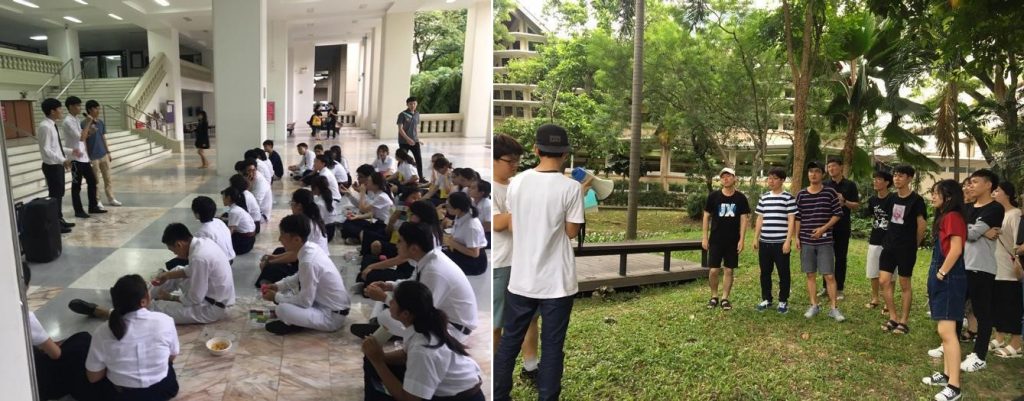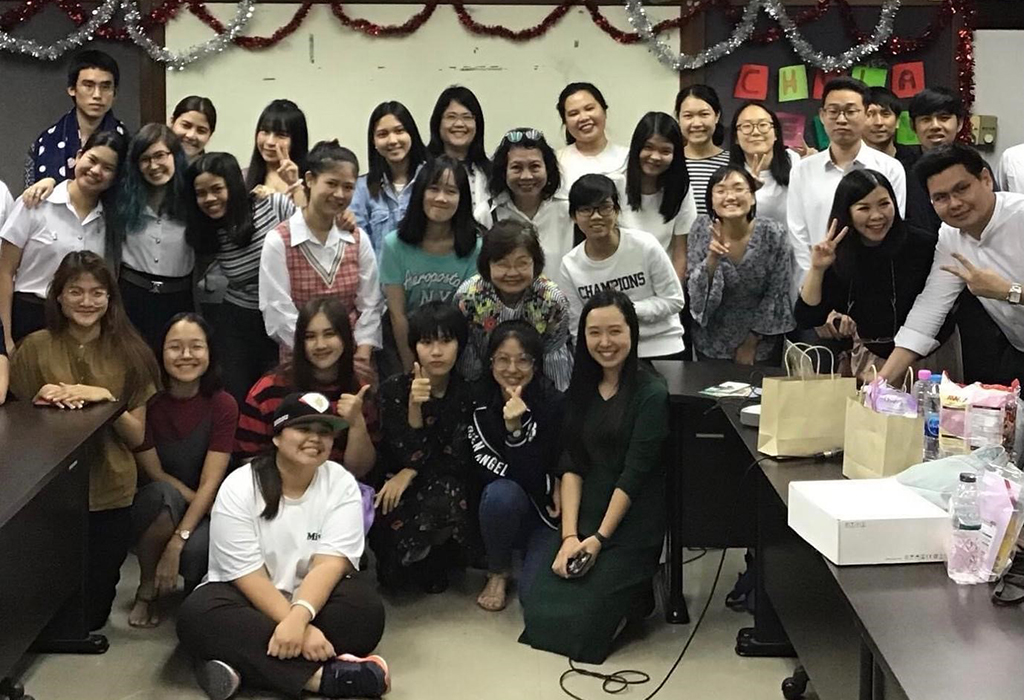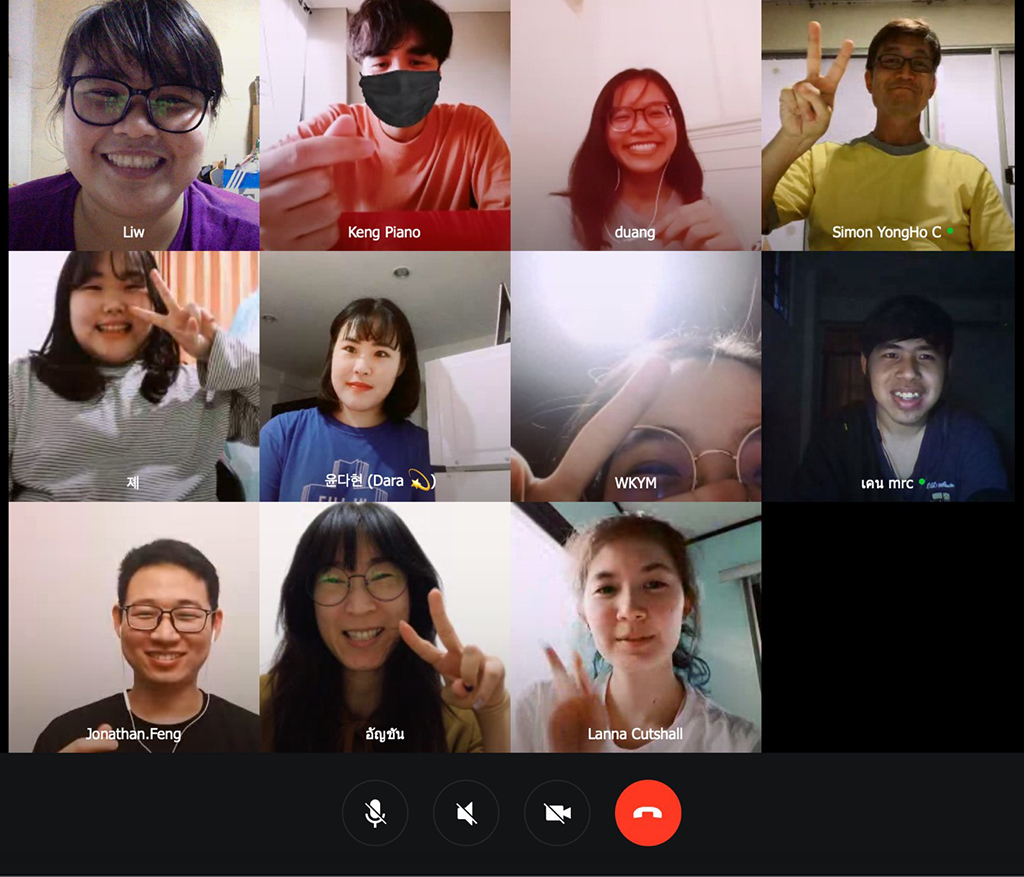The Impact and Challenges of the COVID-19 Pandemic on Christianity in Thailand
contributed by Cui Feng, 5 April 2021
Since the global outbreak of COVID-19 at the end of 2019, Thailand has experienced two peaks of the pandemic. Changing social behaviour in order to curb the outbreak has also deeply affected the religious field. Christianity currently has adherents who represent 1.2% of the total population in Thailand. The pandemic has posed challenges for recruiting new members and evangelising non-believers of Churches in Thailand.
Traditionally, the organization of preach activities to recruit new believers has been crucial to the dissemination of Christianity to most Churches in Thailand. Churches usually organize preach events for non-believers on some important holidays such as Songkran, New Year, and Christmas. Meanwhile, Christian student clubs in universities also promote the gospel when freshmen enter university.

Figure 1 & 2: Thai Christian Student Club organized activities and shared gospel with freshmen in Chulalongkorn University during the orientation week in 2018 (photo taken by the author, Bangkok)

Figure 3: Thai Church and student club organized a Christmas activity to share the gospel to non believers in 2019 (photo collection of the author, Bangkok)
But the spread of COVID-19 around the world has also changed the way Christianity preaches in Thailand. It is clear that the pandemic has had a great impact on the development of new believers in the larger churches, but some smaller churches have shown greater flexibility and adaptability. Glory Temple Church is a small church of less than 50 people in Bangkok. Since the virus outbreak, Glory Temple Church has organized both online and entity worship. Due to the small scale of the church, no special mission team has been established to share the gospel and develop new members. Before the pandemic, the church relied on the personal relationships of church members to invite new people to the church. Church members also use social media such as Line, Facebook and Instagram to post information and invite non-believers to church events.
Waranya Khantiudom, a member of the Glory Temple Church, mentioned that COVID-19 had little impact on the invitation of new members to the church. During the pandemic, they can still invite friends to church activities through personal relationships and social media. Because the number of church members is small, people can keep a safe distance, and it is easy to take protective measures even when new members join in. However, large churches have faced additional challenges in developing new members during the pandemic.
Unlike small churches which rely primarily on interpersonal relationships to invite non-believers, large churches usually have missionary teams and also organize missionary activities for non-believers. However, as a result of the pandemic, large churches have called for strict limits on the number of participants and the formation of activities. Missionary work is also being done online via Zoom.
Watanya Leekasemsap's missionary team in Chiang Mai is dedicated to sharing the gospel with young people and developing new members for the church. The pandemic has brought great challenges to her missionary team. She mentioned that mission conducted online was totally new to everyone on the missionary team and that they had to relearn how to share the gospel with non-believers via the Internet. Since the outbreak of the COVID-19 pandemic, Watanya Leekasemsap’s missionary team has formed a Zoom group to teach Korean to attract young people to Christian activities. Besides, some missionary teams also organized various forms of activities, such as online dance, to attract new members.

Figure 4: Online activities organized by the Christian Organization in Thailand in 2020 (screenshot captured by the author)
However, it is much more difficult to develop new members through online activities than traditional ways. A very important reason is that the pace of building mutual trust through the internet is very slow. The computer screen adds to the sense of distance between missionaries and non-believers. Missionaries in Thailand have pointed out that online activities conducted by the Church should be fun enough to attract people. However, since the computer screen has become the only channel of communication, the diversity of activities is limited. Sometimes, even the organizers express confusion with regards to the Zoom proceedings and awkward moments of silence.
Most people who participated in the online Zoom activities expressed a greater willingness to communicate with friends they already know, while their willingness to communicate directly with strangers online was much lesser. This phenomenon is general, because most participants in Zoom activities prefer to work or interact with familiar people; herein lies, the limitation of Zoom ─ a difficulty in forming friendships between unfamiliar people. Watanya Leekasemsap also confirmed that a big challenge in her preaching activities is building trust with new believers or potential members online.
Moreover, older people could be faced with technical and equipment problems, and may therefore be unable to participate in online events of the church. For instance, some older members of the church may find it difficult to control and adapt to Zoom activities without the help of others. All in all, in churches, Zoom activities are not very conducive in gaining potential members and new believers who are not familiar with each other.
Hang Kan Sang Mai Church (New Creation Church) is a big church with a lot of members in Chiang Mai. To address the shortcomings of online activities, the church set up offline family groups of 3 to 4 people during the pandemic. Family groups have thus become a new form of adaptation to the new situation.
The impact of this pandemic on the way of preaching of Christianity in Thailand seems to be far-reaching. Watanya Leekasemsap has emphasized that even though online activities had so many weaknesses and challenges, most churches would continue to carry out online activities after the end of the epidemic in the future. In other words, future online events will be combined with offline events to share the gospel. As the whole social environment has changed, young people are becoming more and more dependent on the Internet. Only by combining online with offline activities can Thai churches adapt to the development and changes of society in the future and attract more and more young people. The dilemma facing many churches in Thailand is how to make online activities more attractive to non-believers and more effective in spreading Christianity.
Disclaimer: The views and opinions expressed in this article are those of the authors and do not necessarily reflect the position of the blog editorial team or the Asia Research Institute.
South Asia | Southeast Asia | East Asia | Other Places | Hinduism | Buddhism | Islam | Christianity | Other Religions
Disclaimer: The views and opinions expressed in this article are those of the authors and do not necessarily reflect the position of the blog editorial team or the Asia Research Institute.
Cui Feng is a Ph.D. Candidate at National University of Singapore in the Comparative Asian Studies Programme. He obtained his bachelor’s degree at Beijing Normal University, Zhuhai in 2014. He pursued a master’s degree in Southeast Asian Studies at Chulalongkorn University in 2018. His research interests are the Sino-Southeast Asia interactions, and the Cold War in Southeast Asia, with particular focus on contemporary issues in Thailand.

